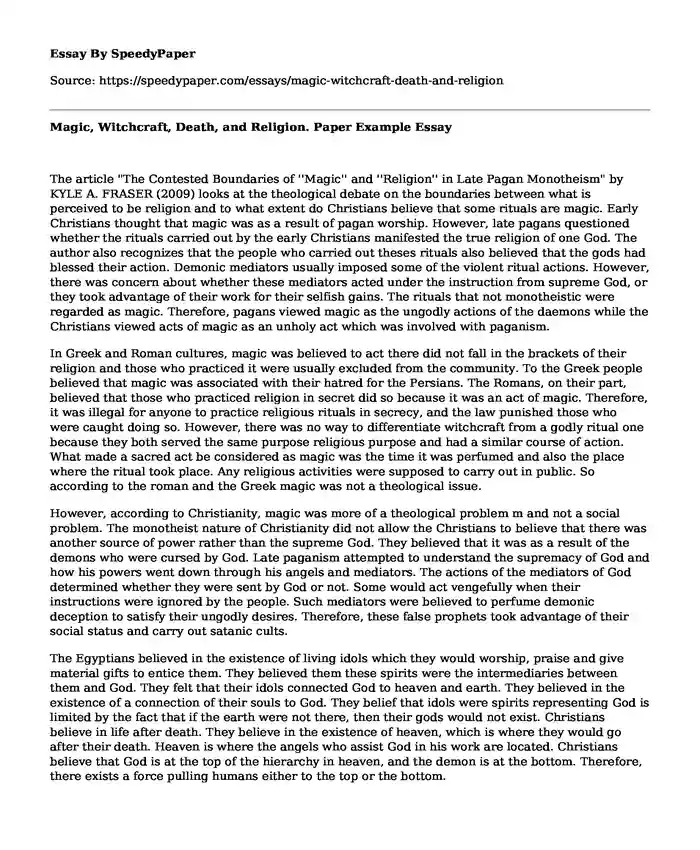
| Type of paper: | Essay |
| Categories: | Culture Philosophy Christianity |
| Pages: | 3 |
| Wordcount: | 689 words |
The article "The Contested Boundaries of ''Magic'' and ''Religion'' in Late Pagan Monotheism" by KYLE A. FRASER (2009) looks at the theological debate on the boundaries between what is perceived to be religion and to what extent do Christians believe that some rituals are magic. Early Christians thought that magic was as a result of pagan worship. However, late pagans questioned whether the rituals carried out by the early Christians manifested the true religion of one God. The author also recognizes that the people who carried out theses rituals also believed that the gods had blessed their action. Demonic mediators usually imposed some of the violent ritual actions. However, there was concern about whether these mediators acted under the instruction from supreme God, or they took advantage of their work for their selfish gains. The rituals that not monotheistic were regarded as magic. Therefore, pagans viewed magic as the ungodly actions of the daemons while the Christians viewed acts of magic as an unholy act which was involved with paganism.
In Greek and Roman cultures, magic was believed to act there did not fall in the brackets of their religion and those who practiced it were usually excluded from the community. To the Greek people believed that magic was associated with their hatred for the Persians. The Romans, on their part, believed that those who practiced religion in secret did so because it was an act of magic. Therefore, it was illegal for anyone to practice religious rituals in secrecy, and the law punished those who were caught doing so. However, there was no way to differentiate witchcraft from a godly ritual one because they both served the same purpose religious purpose and had a similar course of action. What made a sacred act be considered as magic was the time it was perfumed and also the place where the ritual took place. Any religious activities were supposed to carry out in public. So according to the roman and the Greek magic was not a theological issue.
However, according to Christianity, magic was more of a theological problem m and not a social problem. The monotheist nature of Christianity did not allow the Christians to believe that there was another source of power rather than the supreme God. They believed that it was as a result of the demons who were cursed by God. Late paganism attempted to understand the supremacy of God and how his powers went down through his angels and mediators. The actions of the mediators of God determined whether they were sent by God or not. Some would act vengefully when their instructions were ignored by the people. Such mediators were believed to perfume demonic deception to satisfy their ungodly desires. Therefore, these false prophets took advantage of their social status and carry out satanic cults.
The Egyptians believed in the existence of living idols which they would worship, praise and give material gifts to entice them. They believed them these spirits were the intermediaries between them and God. They felt that their idols connected God to heaven and earth. They believed in the existence of a connection of their souls to God. They belief that idols were spirits representing God is limited by the fact that if the earth were not there, then their gods would not exist. Christians believe in life after death. They believe in the existence of heaven, which is where they would go after their death. Heaven is where the angels who assist God in his work are located. Christians believe that God is at the top of the hierarchy in heaven, and the demon is at the bottom. Therefore, there exists a force pulling humans either to the top or the bottom.
The existence of magic has a direct effect on the church and its followers due to the contrasting opinions between Christians and pagans on the belief in magic. The people opposed to magic like Christians may also punish those who they believe is performing magic. Others may decide not to associate with those whom they believe are performing magic in society because it is against their beliefs.
Cite this page
Magic, Witchcraft, Death, and Religion. Paper Example. (2023, Jul 10). Retrieved from https://speedypaper.com/essays/magic-witchcraft-death-and-religion
Request Removal
If you are the original author of this essay and no longer wish to have it published on the SpeedyPaper website, please click below to request its removal:
- Enlightenment - Bacon and Locke, Essay Sample in Philosophy
- Free Essay: Allegory of the Cave Meaning
- Book Review Essay Sample: Dharma in Hell
- Free Essay Example on the Problem of Evil and Suffering
- Paper Example - Islamic Beliefs and Health
- Paper Example. Importance of a Strong Company Culture
- Essay Example. Benefits of Change and Innovation
Popular categories




